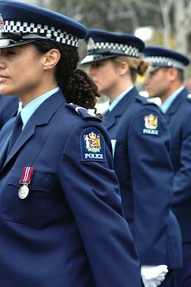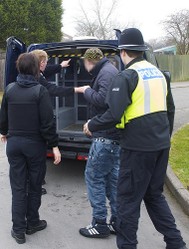Police officers do have very difficult jobs. Their interactions with the public usually happen when some crime or misdemeanour has been committed. They also have to deal with the dregs of society – rapists, murderers, child molesters, and the like. It’s not difficult to see that constant exposure to the world’s gritty underbelly might cause officers to conclude that everybody is a scoundrel until proven otherwise.
This mindset can lead officers to assume the guilt of a suspect they are questioning and this may cause them to fall into the trap of confirmation bias; this a process that afflicts all humans so that we selectively remember or interpret evidence that fits with our own beliefs or theories and ignore information that challenges our notions.

Police Interrogation without the Bullying
by RupertTaylor
There are alternatives to the confrontational interviewing techniques that sometimes lead to false confessions to crimes.
The Reid Technique
Constable Michael Stinson of the Greater Sudbury Police Service in Canada has written that interviewing skill training is often spotty: “Those officers that eventually receive training are usually at the detective rank and have had several years of learning this critical skill on the job, usually from more senior members who themselves have learned it the same way. Arguably, this is not the best training method.”
In most cases, the procedure officers pick up is based on the Reid Technique for interviewing suspects, but this has been criticized because its aggressive assumption of guilt has led to numerous false confessions.
PEACE Interviewing Techniques
In Britain, studies of several miscarriages of justice led to the conclusion that many could be blamed on flawed interrogation methods.
So, in collaboration with psychologists a new approach to interviewing suspects was designed that focuses on unravelling the truth rather than getting a quick confession. Perhaps naively, civilians might have expected the primary goal had always been to uncover the truth, but it seems that isn’t the way it works out in many cases.
The framework for interviewing suspects was developed in the early 1990s and it’s called PEACE, an acronym for:
- Preparation and planning;
- Engage and explain;
- Account clarification and challenge;
- Closure; and,
- Evaluation.
Apart from looking nifty in a PowerPoint presentation that acronym doesn’t tell us much about how things work out in the interview room. Here’s a concise explanation.
What PEACE Interviewing Really Means
Planning – No more going into an interview and winging it in an unstructured form of question, response, question. The interviewer must know what points need to be covered and how to cover them. Planning also means being fully prepared with writing materials, recording equipment, support staff, etc.
Engage and explain – Whether victim, witness, or suspect most people in a police interview room are going to be anxious. They need to have the process explained to them. Also, making the subject more at ease by building rapport opens up communication and leads to obtaining better quality information.
 Account – This covers the method questioning. Closed and leading questions are to be avoided while open questions are the best for eliciting information. Multiple questions rolled into one are not recommended.
Account – This covers the method questioning. Closed and leading questions are to be avoided while open questions are the best for eliciting information. Multiple questions rolled into one are not recommended.
Closure – At the end of the interview everybody present should be given a chance to ask if there are any clarifications or further information they need. The subject should be told what happens next in the investigation and should be given the opportunity to lodge any complaints they may have.
Evaluation – More or less self-explanatory but involves studying the information gathered and making this part of the planning for the next interview.
Clearly, this is just a Post-it note light skim across the surface of the PEACE technique. Mastering it might take an investigator months of training in Advanced Cognitive Interviewing, Conversation Management, and body language.
But, one of the most important aspects is that the suspect’s right to be considered innocent is honoured.
Experience in New Zealand
 Police in New Zealand, as elsewhere, were becoming concerned about the number of miscarriages of justice that were occurring. So, in 2007, Kiwi police began adopting the PEACE technique.
Police in New Zealand, as elsewhere, were becoming concerned about the number of miscarriages of justice that were occurring. So, in 2007, Kiwi police began adopting the PEACE technique.
A government of New Zealand website lists some of the approaches to be used in PEACE interviews:
- “Using unfair means to get a confession…is never justified;
- “Interviewers must avoid unethical behaviours such as making threats or promises or using coercive and oppressive tactics;
- “Ethical interviewing involves treating the suspect with respect and being open-minded, tolerant, and impartial;
- “If offenders believe they have been treated well they are less likely to form a negative view of police or to communicate a negative view of police to others;
- “Many miscarriages of justice have resulted from police malpractice; and,
- “Police need to appreciate the many reasons why witnesses and suspects may not be cooperative in interviews, including fear of embarrassment, retaliation, loss to themselves, legal proceedings, harming someone else, self-disclosure, and fear of restitution.”
Does PEACE Interviewing Work?
A lot of the old hands in the law enforcement trade will say this approach is way to touchy-feely. They believe nothing replaces a tough interrogation for getting at the truth, and if the occasional smack upside the head is needed to improve the memories of suspects, so be it.
So, bringing a non-confrontational approach to investigations will mean a change of culture in many police organizations. This will take time, but there is already evidence that the PEACE system works.
Joe Schlesinger is a veteran Canadian journalist. In a 2012 documentary he looked at problems with police interrogation and reported that after more than a decade of experience with the PEACE system the number of confessions during interviews was the same as with more aggressive questioning. The upside seems to be that the number of false confessions is down.
 | Interviewing and Interrogation The goal in an interrogation, or in any situation where a person with information might be uncooperative, is to effect a transition in willingness ethically and legally. A succe... |
Sources
“Call for Change Questioning Canadian Interviewing Training and Practice.” Cst. Michael Stinson, The Gazette, Volume 73, Number 3, pages 34 – 35.
“Investigative Interviewing: the Literature.” Mary Schollum, New Zealand National Police Headquarters, September 2005.
“Interviewing Suspects of Crime: The Impact of PEACE Training, Supervision and the Presence of a Legal Advisor.” Colin Clarke et al, Journal of Investigative Psychology and Offender Profiling
“Truth, Lies and Confessions.” Joe Schlesinger, CBC News, June 24, 2012.
You might also like
Myths Uncovered about Southern StereotypesHollywood, politics, the media, and others choose to paint Southerners as dum...
Newly Single, Now What?Newly single and struggling? Things you can do to ease the transition from be...









 American Cop Shakedownon 09/16/2014
American Cop Shakedownon 09/16/2014
 Cliven Bundy and the Sovereign Citizenson 08/05/2014
Cliven Bundy and the Sovereign Citizenson 08/05/2014
 How Stores Manipulate Customerson 07/16/2014
How Stores Manipulate Customerson 07/16/2014
 Corruption in Russiaon 06/27/2014
Corruption in Russiaon 06/27/2014



Comments